- The 21 May marks 25 years since the Parliament of Catalonia unanimously approved the recognition of the University of Vic
- The university project, which was restored in 1997, has given way to the University of Vic - Central University of Catalonia, with a federated structure and campuses in Vic, Manresa and Barcelona, and a site in Granollers
- During this time, the University has evolved in terms of its figures for teaching, research and internationalization
The 21 May marks a quarter of a century since the Parliament of Catalonia unanimously approved the recognition of the University of Vic. On that day in 1997, an important milestone was reached, which was to return university status to the city and culminate a process that began in the 1970s with the University Studies of Vic. At the same time, a project was launched that, 25 years later, continues to move forward with the current University of Vic - Central University of Catalonia (UVic-UCC), an institution that is growing annually in teaching and research, that has a prominent presence in international rankings and is rooted in the territory with a clear international vocation.
These first 25 years of the University are, as Josep Eladi Baños, Rector of UVic-UCC, noted, “an opportunity to remember where we came from and what it took to get here.” To reflect on and celebrate this achievement, a series of events and exhibitions have been organized under the motto “25 years. People, knowledge and territory”. Anna Erra, president of the Board of Trustees of Balmes University Foundation considers that “this is an anniversary that marks a before and an after, and goes beyond the restoration of the university in our city. This is not a point of arrival but a starting point, because the university does not stop but goes on.”
The return of university status
The university atmosphere in the streets of Vic today has its origins in the Middle Ages. The Cathedral’s Escriptorium began the tradition of higher studies in the city. These studies were consolidated with the foundation of the Universitat Literària (1599), which was abolished with the other Catalan universities in 1717, following the Nova Planta Decree. Thirty-five years later, in 1749, the creation of the Vic Seminary brought higher studies (then in Theology) back to the city, which in the nineteenth century became an important focus of the Renaissance.
Vic City Council tried unsuccessfully to rebuild the university at the end of the nineteenth century. However, this was not achieved until 1997. According to Baños, “becoming the University of Vic was an impetus for the institution to become stronger and take on a new dimension, moving to occupy a place on the Catalan university map.”
In this way, the Jaume Balmes University School of Teachers of Vic project, which had started in 1977, was consolidated. This project grew throughout the 1980s and the 1990s, with the constitution of university schools and faculties: the Osona University School of Nursing (1981), which emerged from the Osona Women’s School of Nursing Auxiliaries (1974), the Osona University School of Business Studies (1987), the Osona Polytechnic University School (1989) and the Faculty of Translation and Interpretation (1993), together with the companies Eumo Editorial (1979) and Eumogràfic (1984).


The federal model
In the twenty-first century, the University has expanded, first with the incorporation of BAU, EADA and ESERP as affiliated centres and then with the deployment of an ambitious, innovative federal model. Thus, after the foundation of the university, the next turning point in the project was the process of federation, in 2014, between the Balmes University Foundation (FUBalmes), which is the owner of the University of Vic, and the Bages University Foundation (FUBages), which is the owner of the university studies in Manresa. This first alliance led to the current University of Vic - Central University of Catalonia.
Joan Turró, general director of FUBalmes, said that the commitment to a federated structure has meant “for the University the consolidation of a growth model different from that of the other universities in the education system, based on agreements with entities that have their own history and culture and respecting their personality, while sharing a joint project, UVic-UCC.” Valentí Martínez, general director of FUBages, also gave a very positive assessment, stating that the federation “has produced considerable qualitative and quantitative growth in the university field.” At FUBages, “being part of a university allows you to carry out academic projects with peace of mind, and expand the international or research field,” and for the city of Manresa “it is obvious to everyone that it is also a positive element, basically due to its connection with the city of Vic.”
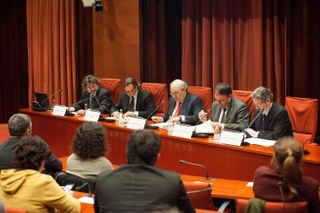
Later, in 2016, came the creation of the new site in Granollers and the incorporation into the federated structure of the Foundation for Higher Studies in Health Sciences (FESS), which led to the launch of the Faculty of Medicine the following year. This new project, the first between Vic and Manresa, has added value to the institution in different areas. As Josep Arimany, President of the FESS, stated, “firstly, it is an asset for UVic-UCC and, secondly, it is a centre for health, economic and social development in inland Catalonia, which attracts and will attract talent in the future.”
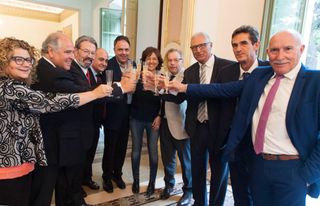
More recently, the federation with the Elisava University School Private Foundation (2020) reaffirmed the institution’s federation model and means that it has an important presence in the Catalan capital. For Elisava, it is also an important milestone, “an ambitious and exciting new stage that represents a change of scale, that allows us to become a faculty and that represents a clear position before society,” said Javier Peña, general director and scientist of this foundation. He also considers that the agreement boosts Elisava’s research.
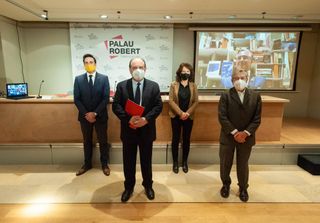
In this way, the foundations are integrated into a joint university project, that of UVic-UCC, which carries out teaching and research activities through the Vic, Manresa and Barcelona campuses, and the Granollers site. This structure allows us to join forces and create synergies to strengthen the University and the public service it provides, and become a factor of territorial equilibrium in Catalonia. In the words of Anna Erra, growing in other territories “strengthens the University, as the sum of the entities has a multiplying effect” and at the same time “enriches the municipalities and gives them the opportunity to bring knowledge closer and transform society and citizenship, especially among young people.”
The president of the Board of Trustees of FUBalmes explained that all this has been possible due to the institution’s unique model of governance, with its own legal personality, a clear vocation for public service, strong territorial roots and a close link with the network of companies and economic, cultural and social institutions in the field. Anna Erra stressed that this model has become a benchmark and has very positive aspects, as “it gives us great flexibility and a different way of doing things, more in line with international universities.”
The evolution in figures: people and knowledge at the service of the territory
Over these 25 years, the university has become a focus of knowledge and innovation in central Catalonia and in the rest of Catalonia and Spain. For Josep Eladi Baños, “UVic-UCC is reaching its 25th anniversary at a good time. The number of students has grown exponentially, as has research, and the future points to a similar line of expansion.” This statement is backed by international data and rankings, including the World University Rankings of Times Higher Education, which UVic-UCC entered last September, placing it as the fourth Catalan university and sixth state university, and the third best young Catalan and Spanish university.
In teaching, the number of undergraduate courses has risen from 14 pre-EHEA bachelor’s degrees and diplomas in the 1997-1998 academic year to 37 bachelor’s degrees in the 2022-2023 academic year. During the first academic year as the University of Vic, there were no master’s degrees, while in the current academic year there are 14. Doctoral courses have also undergone significant development under the auspices of the Doctoral College. They have increased in number from 1 to 10. Finally, since academic year 2014-2015, the institution has made a commitment to higher training cycles (CFGS), with the creation of the Professional Campus that next year will offer 9 courses. The evolution has not been limited to official training, but has also included continuing education. In the 2020-2021 academic year, 176 continuing education programmes were offered.
The number of students has also increased exponentially. Numbers have risen from 3,650 students of official degrees in the 1997-1998 academic year to 10,821 in the 2021-2022 academic year, according to data from last October. Directly related to the increase in degree courses and students, there has been an increase in the total number of teaching and research staff and administrative and service staff. The numbers during the 2020-2021 academic year stood at 1,203 and 461, respectively.
In research, the resources obtained from competitive calls and the scientific output have increased sharply over the last quarter of a century. Funding rose from under 500,000 euros in 2008-2009 to 5,700,000 during the 2021-2022 academic year. The number of articles in indexed journals has gone up from 50 in the 2004-2005 academic year to almost 500 in 2021-2022, due to advances in scientific research with 32 recognized groups, 15 chairs, and 5 research and knowledge transfer centres.
Finally, international mobility has also increased. In the 2019-2020 academic year, the last year in which normal travel took place before the pandemic, 1,141 students were involved in international mobility experiences, which is far from the 147 in academic year 2002-2003. This context led Ricard Torrents, the first rector of the University, to state that “the Catalan and scientific university that was my ideal is the one you currently have, where you can study, research and prepare for the future.”
A future full of projects and new challenges
In full celebration of the 25th anniversary, the rector highlighted the consolidation and expansion of the federated project as one of the main challenges of UVic-UCC: “It is a complex model, with little tradition, which creates additional work to unite all the institutions that are part of it, especially as it grows,” he stated.
He also listed other proposals, such as the implementation of the 2 + 3 Project, designed to recognize higher training courses as higher education at the same level as university bachelor’s degrees, but with differentiating elements; to expand studies in the field of health and growth in the field of social sciences; to create research institutes with their own legal personality, or to boost the cross-disciplinary nature of the teaching community, so that there is greater collaboration between professors from the various faculties.
In short, “the UVic-UCC project is the result of the sum of many wills; the generosity, contributions and hard work of hundreds of people; the creation and transmission of knowledge in very different fields, and the confidence of students and their families,” concluded Anna Erra. Josep Eladi Baños added: “all this has made the University a strategic tool for the social, economic and political fabric of central Catalonia; we are reaching our 25th anniversary in a good position internationally and looking to a future that is territorial and global.
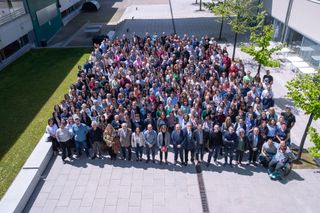
Events and exhibitions to celebrate the 25th anniversary
Under the motto “25 years. People, knowledge and territory”, a series of events and activities have been organised to commemorate the 25th anniversary of UVic-UCC. As Anna Sabata, Secretary General of the University said, this motto “emphasizes what is really important to the UVic-UCC: the people, that is, the students, but also all the teaching and research staff and administration and services staff; knowledge, a crucial aspect in an institution such as a University; and the territory, taking into account that the territorial project is a fundamental point.”

The celebration of the 25th anniversary includes some thirty events, including exhibitions, more institutional events, and more purely leisure activities and shows. The programme was developed in a cross-cutting way, with the involvement of the university community. The main programme runs from the end of April to the end of June. However, in February some activities related to the 25-year anniversary were carried out and the anniversary will end with the start of the 2022-2023 academic year, when it will be 25 years since the first academic year was inaugurated at the University of Vic.
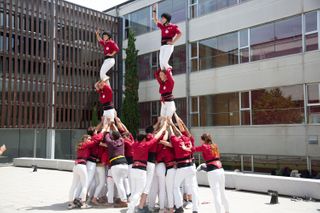
Among other events, several exhibitions have been prepared, as well as a photograph of the university community, round tables with former rectors, former vice-rectors of research, and former and current students of UVic faculties, and an institutional event at the Palau Robert in Barcelona to open the exhibition “UVic-UCC, 25 years. People, knowledge and territory”, which can be visited until 19 June.
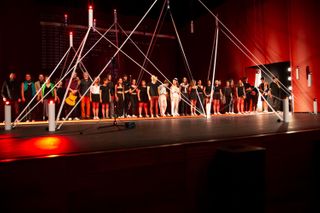
However, one of the main events in the commemoration of the first quarter of a century of UVic-UCC took place on May 20, coinciding almost exactly with the day that the Law of Recognition of the University of Vic was approved. This was celebrated with an institutional event in the Great Hall and a poetic, musical and visual show PRE LU DI for the whole community, in the Atlàntida theatre. The programme of events also includes the graduation ceremony for Òscar Camps, founder of the NGO Proactiva Open Arms, as an honorary doctor.
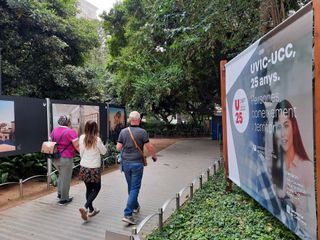

Access to the 25th anniversary programme.

Dolors Ruiz Zafra
Administration and services professional - Secretary of the Dean's Office
“On 21 May 1997 we felt happy. I think that was the emotion shared by everyone. We knew that a delegation was going to Parliament and we were waiting for their return to find out how everything had gone. I also remember the lunch, which could not be held because it was raining, and the words of Segimon Serrallonga, who said that this had been the best baptism the University could have had.”

Francesc Codina Valls
Professor at the University School of Teachers and former dean of FETEP
“UVic-UCC is a community dedicated to knowledge in all its dimensions, which include study, research, teaching and learning, and I think it is important to emphasize the symbiosis that exists between the individual work of teachers and students, and the collective work of research groups, departments and class groups. The School of Teachers was founded in the period of political transition and made its contribution in two important fields. One was updating pedagogy and the other was all aspects of the Catalanization of the language and content of the Catalan school.”

Marta Otero Viñas
Vice-Rector for Research and Knowledge Transfer (2008-2014)
"The progress of UVic-UCC’s research activity over the last ten or fifteen years has been extraordinary. Not only in terms of the scientific output, which has been very relevant, and the ability to obtain new competitive funding, but also the very significant increase in the training capacity of doctoral studies. And all this in a university that has much smaller dimensions than any other university in the Spanish public system that does research at the same level.”

Eva Bujons Cudinach
Student on the bachelor’s degree in Audiovisual Communication
“One of the things I value most about the University is the facilities, because I was able to take classes on a TV set or in a radio studio, and I did shoots that brought me closer to the world of work. Here I learned, I grew and I picked up the little things you need to work in the world of audiovisual communication. In ten years, I hope that the University will continue to be a bit like it is now, because here you learn through practice, with one foot in the present and the real world, and this brings you closer to what you will find when you finish.”